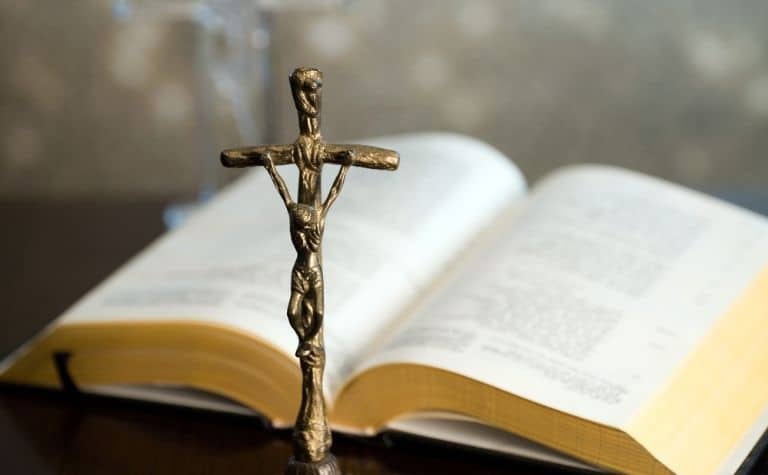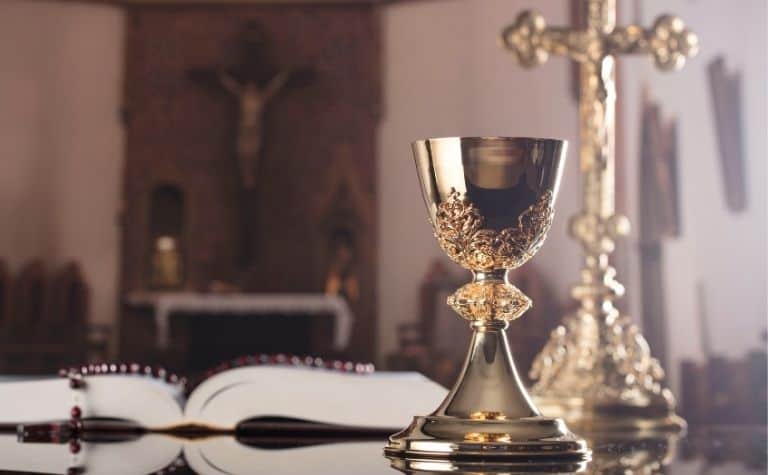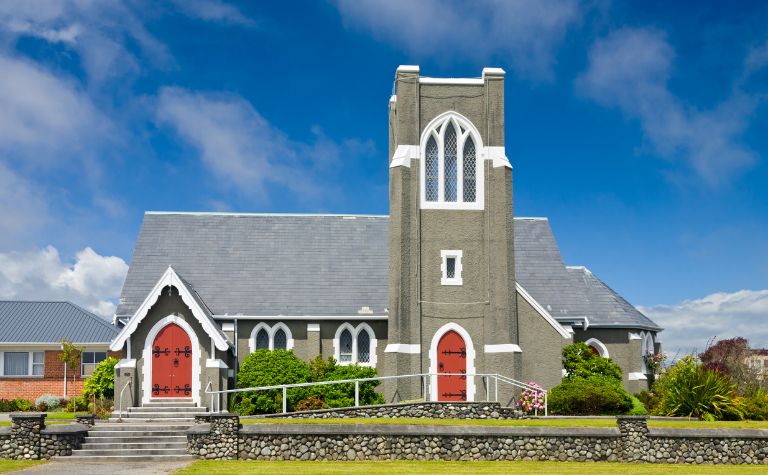The Lord’s Supper is one of the most essential practices in the Presbyterian and Roman Catholic traditions. Yet these two historical branches of the Christian faith believe differently about the bread and the cup. Many people wonder if Presbyterians can take communion in a Catholic church.
Presbyterians can’t receive the Eucharist in a Roman Catholic Mass. Catholicism teaches Presbyterians aren’t part of the true church (1 Cor. 10:17), and to partake in the bread and cup would invite judgment upon themselves, even death (1 Cor. 11:29). Exceptions to this rule are infrequent.
What’s the difference between Presbyterian and Catholic communion? What are the rare exceptions by which a non-Catholic Protestant, like a Presbyterian, can receive it? Keep reading to learn more.
Also, see Presbyterian vs Roman Catholic: What’s the Difference? to learn more.

Presbyterian and Catholic Communion Compared
To understand why the Catholic church prohibits Presbyterians from receiving communion, it’s essential to understand how the traditions view the bread and cup differently. The comparison chart below is a starting point to help people understand the similarities and differences.
| Presbyterianism | Catholicism | |
|---|---|---|
| Name | Mostly referred to as The Lord’s Supper or communion, a small number of Protestants use the term Eucharist. | Often referred to as The Eucharist,” from the Greek word meaning “to thank,” it’s also referred to as Holy Communion and the Lord’s Supper. |
| Nature | Mostly referred to as The Lord’s Supper or communion, a few Protestants use the term Eucharist. | Participants are encouraged to confess their sins to God before consuming the elements. |
| Participants | Christians; many Presbyterian churches allow non-Presbyterians Christians to participate | Christians (i.e., Catholics) |
| Confession | Participants are encouraged to confess their sins to God before consuming the elements. | Participants are encouraged to confess their sins to God before consuming the elements. |
| Elements | Often referred to as The Eucharist,” from the Greek word meaning “to thank,” it’s also called Holy Communion and the Lord’s Supper. | Transubstantiation; the bread and wine are literally transformed into the actual body, blood, soul, and divinity of Christ |
| Grace | It is not a means of grace | It is a means of grace |
| Fasting | There is no formal recommendation regarding fasting | Participants must avoid food and drink for at least one hour after consuming the elements; exceptions are made in some cases for the elderly and for those who require medicine*** |
| Exclusions | Non-Christians | Non-Catholics; those excommunicated from the Catholic church. |
*Confess as soon as possible [Code of Canon Law 916]: “A person who is conscious of grave sin is not to celebrate Mass or receive the body of the Lord without previous sacramental confession unless there is a grave reason and there is no opportunity to confess; in this case the person is to remember the obligation to make an act of perfect contrition which includes the resolution of confessing as soon as possible.”
**The bread and cup are Jesus’ body and blood [Code of Canon Law 899]: “The eucharistic celebration is the action of Christ himself and the Church. In it, Christ the Lord, through the ministry of the priest, offers himself, substantially present under the species of bread and wine, to God the Father and gives himself as spiritual food to the faithful united with his offering.”
***Fast for an hour [Code of Canon Law 919]: “A person who is to receive the Most Holy Eucharist is to abstain for at least one hour before holy communion from any food and drink, except for only water and medicine.”
Bishops Disallow Non-Catholic Participation
Other than church members in good standing, who can take communion at a Catholic church has often been the subject of discussion and debate. Church leaders have addressed the issue more in recent decades. (Also see Presbyterian vs. Episcopalian: What’s the Difference?)
This may be due to increased ecumenical partnerships, which has exposed more people to the Catholic church. In 1996, the National Conference of Catholic Bishops articulated instructions about who can receive the Eucharist:
“Because Catholics believe that the celebration of the Eucharist is a sign of the reality of the oneness of faith, life, and worship, members of those churches with whom we are not yet fully united are ordinarily not admitted to Holy Communion. Eucharistic sharing in exceptional circumstances by other Christians requires permission according to the directives of the diocesan bishop and the provisions of canon law (canon 844 §4, emphasis added).
Members of the Orthodox Churches, the Assyrian Church of the East, and the Polish National Catholic Church are urged to respect the discipline of their own Churches. According to Roman Catholic discipline, the Code of Canon Law does not object to the reception of Communion by Christians of these Churches (canon 844 §3).” Guidelines for the Reception of Communion [3]
While some suggest that having a “closed table” communion, instead of an “open table” format hurts the Catholic church’s relationship with other professing Christians, Catholic doctrine has been, and always will be, non-negotiable. (Also see Can a Catholic Go to a Presbyterian Church?)

Exceptions For Protestants Are Rare
Under rare circumstances, Protestants such as Presbyterians can receive the Eucharist. While it’s unlikely, it’s possible when the right circumstances are met. According to Canon Law, the parameters are:
“If the danger of death is present or other grave necessity, in the judgment of the diocesan bishop or the conference of bishops, Catholic ministers may licitly administer these sacraments to other Christians who do not have full Communion with the Catholic Church, who cannot approach a minister of their own community and on their own ask for it, provided they manifest Catholic faith in these sacraments and are properly disposed.” (Code of Canon Law 844)
Why would a Presbyterian want to take communion in a Catholic church? Many Protestants, Presbyterians included, are uncomfortable receiving communion in a Catholic Mass because they don’t believe Jesus spoke literally when he said that the bread was his actual body and the cup was his actual blood. (Also see Presbyterian USA vs. Presbyterian Church in America: What’s the Difference?)
Nevertheless, some Presbyterians would take communion in a Catholic church if allowed, even if they disagreed with the theology. The reasons they would want to do this vary:
- Perhaps a member of a Presbyterian church is marrying a member of a Catholic church, and the wedding is in a Catholic church and includes the Eucharist.
- Perhaps a Presbyterian family or friends are visiting a loved one who is a member of a Catholic church and wants to fully participate in the Mass.
- Perhaps the only church in a particular area of the world is Catholic, and it’s the only place a Presbyterian has to go to hear Scripture, worship Christ, and be with other professing Christians.

Exception For Eastern Orthodox Are Infrequent
Members of the Eastern Orthodox Church have the same convictions about the Lord’s Supper as Catholicism. Because of this, Orthodox church members can receive the Eucharist under the right circumstances:
“Catholic ministers may licitly administer the sacraments of penance, Eucharist and anointing of the sick to members of the oriental churches which do not have full Communion with the Catholic Church, if they ask on their own for the sacraments and are properly disposed. This holds also for members of other churches, which in the judgment of the Apostolic See are in the same condition as the oriental churches as far as these sacraments are concerned.” (Code of Canon Law 844)
Also, see What’s the Difference Between Presbyterian and Evangelical? to learn more.
References:
[1] Source
[2] Source
[3] Source
Related Questions
The Presbyterian and Baptist traditions are influential Protestant denominations that have left their mark in Europe, America, and worldwide. The traditions agree on many important matters of faith...
Protestant and Presbyterian are two terms associated with Christianity, but many people aren't sure what the differences are between them. Some people know that neither Protestants nor Presbyterians...
